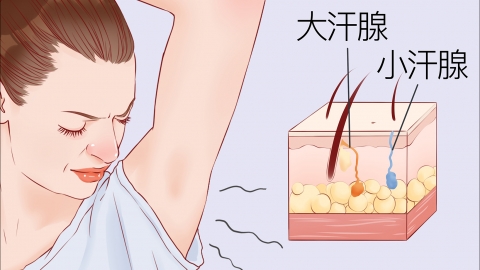How to treat body odor (bromhidrosis)
Axillary osmidrosis usually refers to axillary bromhidrosis. Generally speaking, axillary bromhidrosis may be caused by factors such as dense axillary sweat glands, delayed axillary hygiene, local bacterial infection, hyperhidrosis, or dysfunction of apocrine sweat glands. It is recommended to seek timely medical consultation, identify the underlying cause, and then improve the condition under a doctor's guidance through general treatments, medication, surgical treatments, and other approaches. A detailed explanation is as follows:

1. Dense axillary sweat glands: There are numerous apocrine and eccrine sweat glands in the armpits, which secrete a large amount of sweat daily. The sweat is decomposed by bacteria on the skin surface, producing an odor that becomes more noticeable after exercise. It is recommended to wash the underarms twice daily with a mild shower gel and promptly wipe off sweat with a clean towel after perspiring.
2. Delayed axillary hygiene: Failure to regularly clean the underarms in daily life allows sweat and sebum to remain on the skin surface, providing favorable conditions for bacterial proliferation, thereby intensifying the odor. In addition to regular daily cleansing, it is recommended to use a mildly acidic cleanser 1-2 times weekly. After washing, use a dry towel to absorb excess moisture and avoid leaving a damp environment.
3. Local bacterial infection: Excessive proliferation of bacteria such as Staphylococcus and Streptococcus in the armpits breaks down organic substances like proteins and fatty acids in sweat, producing volatile foul-smelling compounds. Patients should follow medical advice to apply medications such as aluminum chloride solution, formaldehyde solution, or hexamethylenetetramine solution to the underarms to inhibit bacterial growth and sweat secretion.
4. Hyperhidrosis: Autonomic nervous system dysfunction increases the excitability of axillary sweat glands, causing excessive sweating even without physical activity. Prolonged skin exposure to sweat intensifies the odor. Under medical guidance, botulinum toxin type A for injection may be used to inhibit neurotransmitter release, thereby reducing sweat gland secretion and alleviating excessive sweating and odor.
5. Abnormal apocrine sweat gland function: Abnormal development or hyperfunction of apocrine sweat glands results in sweat with high levels of organic substances. Bacterial decomposition produces a strong odor, which is difficult to relieve through routine cleaning. When surgical indications are met, patients may undergo minor incision apocrine sweat gland excision as directed by a physician, removing the diseased apocrine sweat gland tissue in the armpits, thereby reducing sweat secretion at its source and improving the odor.
In daily life, avoid consuming pungent foods such as garlic, onions, and chili peppers to reduce the production of odor-causing substances in sweat. Change clothing promptly after exercising to keep the underarms dry and reduce the impact of axillary bromhidrosis through comprehensive care, thus maintaining skin health.




